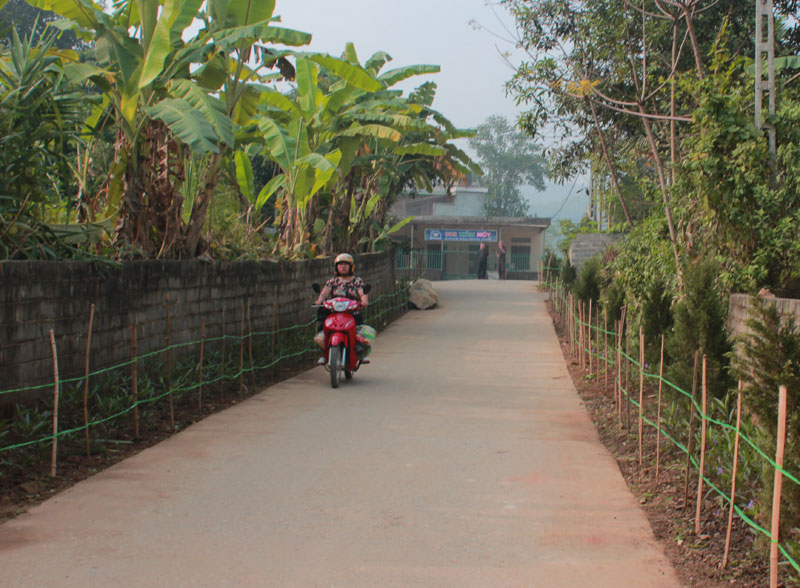
HBO - According to the Provincial Coordinating Office of the new rural area, up till now Hoa Binh city has completed the task of building the new rural area, 63 communes have been recognized to meet the standards of the new rural areas in Hoa Binh province. The whole province has reached 13.3 criteria per commune and there are not any more communes reaching under 7 criteria.

Nut village, Dan Ha commune (Ky Son) has been building a new model of the rural residential area with a beautiful concrete road and a flower plantation on both side, creating a clean, green and beautiful view.
The system of rural socio-economic
infrastructure has strongly developed, changing the face of many rural areas
across the province. The implementation of the new residential model is to continue
improving the quality for the set of the National Criteria for the construction
of new rural areas. Although it has just started to deploy, it has reached many
positive results initially.
The different levels of government have flexibly mobilized a
lot of resources to carry out the tasks. Some residential areas have made good
changes in economic development and building a beautiful view and fresh
environment. The criteria of the new rural areas are more and more improved,
meeting the aspiration of the people. The models of residential areas and
gardens have been formed.
Mr. Nguyen Anh Quan, the head of the Provincial Coordinating
Office, says that in 2019, the province has developed a plan so that each
commune meeting the standard of the new rural area can select one residential
area to build the model of the new rural area. Accordingly, the provincial
budget supports 30 million VND for each village to build the model of the new
rural area.
The Office of the Provincial Coordinating Office of the new
rural area requests that the local authorities continue to promote the
propaganda and the mobilization in various forms to raise the awareness of
officials and people. At the same time, the building of this model should be
attached to other movements such as "All people unite to build a cultural
life", "five-no, three-clean", "Farmers producing well and
doing good business" and so on. All activities in building the model of
new residential areas must come into essence and the achieved results must
ensure the high sustainability.
The Standing Board of the Hoa Binh provincial Party Committee has agreed in principle on a proposal by the Standing Board of the Party Committee of Hoa Binh city to gather feedback on the city’s 1:2000 zoning plan, which forms part of its broader urban development strategy.
Hoa Binh province has made notable progress in public administration reform and digital government development, with the satisfaction index among citizens and businesses reaching over 84%, according to recent government evaluations.
Thanks to great efforts by local authorities in recent times, the governance and public administration performance of Mai Chau district has been significantly improved.
In the afternoon of June 6, the Party Committee, the People's Council, the People's Committee and the Fatherland Front of Lac Son district solemnly held a meeting to celebrate the 139th anniversary of the district's founding (1886–2025) and the 79th anniversary of the establishment of the district's Party Committee (1946–2025). There was the attendance of Mr. Bui Van Thang, the Vice Chairman of the Provincial People's Council; Mr. Quach Tat Liem, the Vice Chairman of the Provincial People's Committee; Ms. Dang Bich Ngoc, the Deputy Head of the National Assembly Delegation of the province; as well as the former leaders of the province and district through various periods, who are the natives of the district.
Implementing the Politburo’s Resolution No. 57-NQ/TW on breakthroughs in science – technology, innovation, and digital transformation is a golden opportunity for the northern mountainous province of Hoa Binh to renew growth model, improve competitive edge and shorten digital gap.
Resolution 57-NQ/TW, issued by the Politburo on December 22, 2024, identifies sci-tech, innovation, and digital transformation as strategic breakthroughs to build a developed and prosperous nation. In Hoa Binh province, this spirit is not just a slogan, it’s being put into action through concrete initiatives that form a "new development triangle”: digital citizenship, digital economy, and digital administration.



